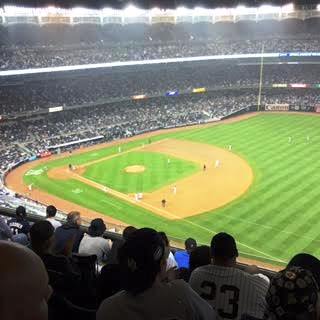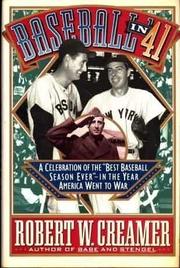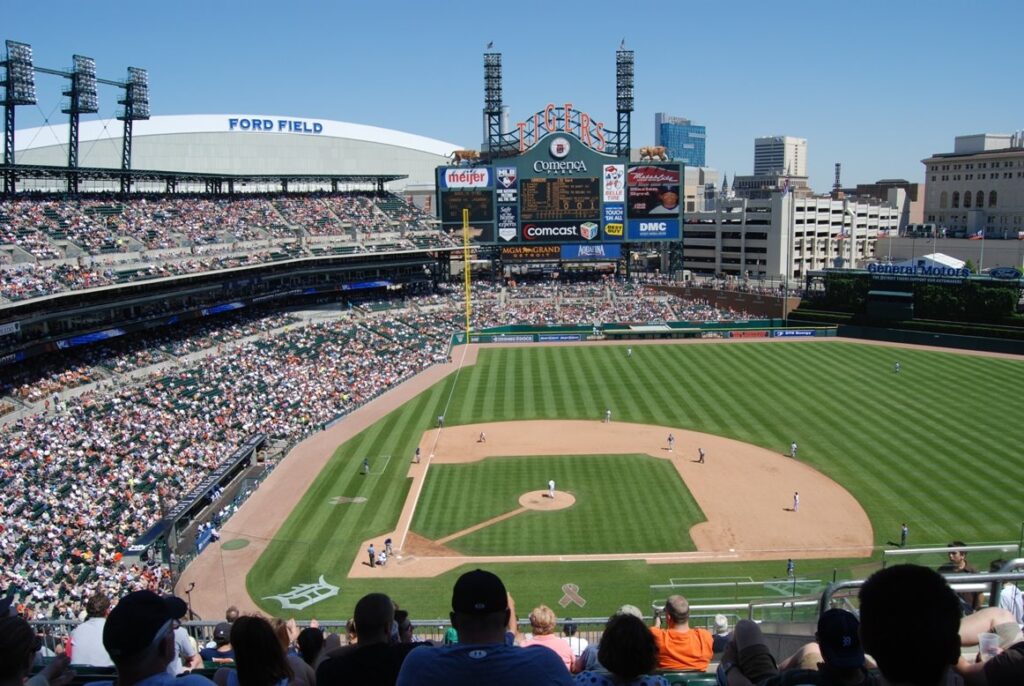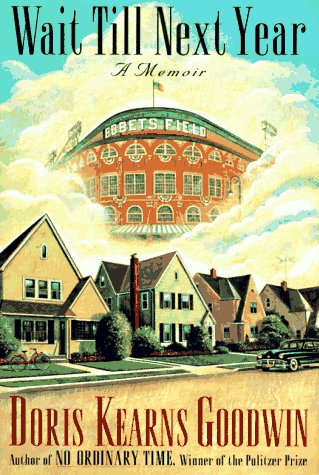
It looks like we’ll have a baseball season this year. Why are there so many good baseball books? I don’t know of any other sport who produces as many good writers as baseball. In anticipation of the season, I listened to Robert Creamer’s Baseball in ’41, which I’m reviewing below. I’m also attaching a review of another baseball book I read several years ago by the famed Presidential historian, Doris Kearns Goodwin. And, for those who want to ponder baseball and religion, here’s a link to my review of Baseball as a Road to God, written by John Sexton.
Robert W. Creamer, Baseball in ’41: A Celebration of the Best Baseball Season Ever in the Year America Went to War

(1991: Audible 2005) Read by Tom Parker. 8 hours 46 minutes.
This book is part memoir, part baseball history, and part history of America on the eve of World War II. The author, Robert Creamer, was a nineteenth-year college student between his two “first years” of college (he admits having to redo his freshman year). While war talk is in the air, the great advances of the German army of ’39 and ’40 seemed stalled after they had conquered Western Europe. That would change late in the summer when German attacked the Soviet Union. America was trying to stay neutral while arming Great Britain. And it was the year that a young Ted Williams hit .406 and Joe DiMaggio hit in 56 concessive games.
The draft of young men for the military resumed. Draftees had a year enlistment. Some in baseball made the case for those drafted (it wasn’t a large draft in ’41), to join so that they would only miss one season instead of straddling two seasons. The draft included one of baseball’s all-time great players, Detroit’s Hank Greenburg. He entered the military with much fanfare and missed the season. At the end of the year, he had fulfilled his commitment and released from duty two days before Pearl Harbor. He would rejoin the military two days later. Greenburg missed four and a half seasons at the peak of his career, which probably is why he is not as well-known as other players of the era or before.
While no one was sure when the United States would join the war, many felt it just a matter of time. This summer, one major league game paused as President Roosevelt addressed the nation about the need to be prepared. His address played over the stadium’s PA system, after which the game resumed. Of course, the next year things would change after Pearl Harbor. Many of baseball greats either joined or found themselves drafted into the military. ’41 was the last year in which the majors consisted of most of its big names. Even Williams and DiMaggio went off to war.
In 1941, the Yankees redeemed themselves from their failure of the year before. They faced some challenges early in the season, especially from Cleveland and their ace, Bobbie Feller (later known as Bob Feller). But the Yankees won the pennant earlier than ever. Instead, the America League excitement came from Williams and DiMaggio’s hitting. In the National League, the St. Louis Cardinals and the Brooklyn Dodgers remained in a head-to-head race throughout the season. The National League pennant was decided in the closing days of the season. St. Louis with their extensive farm teams could call up new players when others were hurt, something they dealt with a lot in ’41. Leo Durocher’s Dodgers, a historically second division team (the bottom 4 teams of an 8-team league), were finally playing well and no longer worthy of their nickname, “the bums.” However, in the World Series, the Yankees easily beat the Dodgers in five games.
As he weaves in throughout the book, 1941 was not only a season of change for baseball. The author went through a change as his older brother signed up for the Army Air Corp. The next year, he, too, would be in the military. He would later become a correspondent for Sport’s Illustrated and go on to write many baseball books including biographies of Babe Ruth and Casey Stengel. Creamer claimed to be a Yankee fan in ’41, and it seems that his interest in baseball continued to follow that path.

Doris Kearns Goodwin, Wait Till Next Year: A Memoir

(New York: Simon & Schuster, 1997), 261 pages, some photos.
Goodwin, a renowned historian and author of many presidential biographies, recalls her childhood fascination with the Brooklyn Dodgers in this delightful memoir. The Dodgers were referred to as bums, as it seemed they would never win a World Series. In the forties and fifties, they were a National League powerhouse, often winning the pennant, but losing in the Series. They were “always the bridesmaid, never the bride.” Against this backdrop is a young girl whose father taught her how to keep score. As she became better at scoring, she would listen to the afternoon game and then retell the events of the game to her father when he came home from his job as a bank examiner. She credits baseball with making her a historian and storyteller as she learns to build suspense in recalling the events of the game.
As Goodwin recalls each season in which the Dodgers disappoint them again, she shares memories of growing up in her Brooklyn neighborhood as well as events happening in the country and around the world. She lived by two calendars: one from church and the other from baseball. She tells many humorous stories such as making her confession before her first communion. It has been impressed upon her how serious this is and to think hard about her sins. She realizes she has been wishing bad things upon others, such as wanting a certain Yankee player to break an arm or a Phillies ball player to experience some other kind of misfortune. As she confesses, the priest’s giggles and admits that he too is a Dodger fan. Then, he uses the occasion to teach a lesson, asking how she’d feel if the only way the Dodgers win the Series is that all the other players are injured. Another story involved Old Mary, who lived in a dilapidated house. The neighborhood children were sure she was a witch and set out spying on her. When Goodwin’s mother learns of how they have been treating Mary, she takes her daughter down to meet the old woman who was from the Ukraine and had learned only broken English. A few months after meeting this nice but lonely woman, she dies.
Goodwin enjoyed school, especially literature and geography. She even had a teacher who required them to learn the main towns along the Trans-Siberia, Trans-Mongolian, and Trans-Manchurian railroads, along with the Baikula-Amur line. However, I’m not so sure about the Baikula-Amur line, a Siberian railway that runs north of Lake Baikal, as most of the work on it was twenty-plus years after Goodwin had finished school.
In addition to what was happening locally, Goodwin reflects on the national events. The fifties were the waning years of segregation, and she pays attention to the events at Little Rock. She ponders over the Rosenberg’s children after their execution and worries over the Soviet’s exploding an atomic bomb. She goes out and searches for the first satellite launched by the Soviets. All this is recalled as Goodwin recaps each season. The book comes to a climax in 1956, when the Dodger’s beats the Yankees for their first World Series win. She and her parents celebrated in downtown Brooklyn. But with the win comes losses. Goodwin’s childhood friend moves away, a trend that will happen repeatedly with the affluence of the 50s. She becomes interested in boys. Then her mother dies and her father, who is heartbroken, decides to sell the only house she’s ever known. Then the final straw breaks in 1957, as the Brooklyn Dodgers (along with the hated Giants) announce they will relocate to the West Coast. The magic of childhood has passed her by.
In the Epilogue, Goodwin writes about how she again fell in love with baseball as a graduate student at Harvard. This time it was with the Boston Red Sox, a team who (at the time of the writing of her memoir) was a lot like the old Dodgers. Although they often had good teams, they were unable to win the Series. Goodwin, like her father before her, has the pleasure to introduce her children to the magic of the game. Goodwin is a wonderful storyteller and has an eye for history (with perhaps the exception of Russian railroads). I enjoyed this read


Baseball is one of the sports I love. When I was little, my grandfather and I were glued to the radio, listening to games, so maybe my fondness comes from sweet memories. Also, I know the rules, so following along is easy as well as fun. I still like tuning in to listen to a weekend game on the radio, especially when the announcer is exciting. I get what I call my “homerun” chills.
What a great memory with your grandfather. Interestingly, I remember watching Saturday games with my grandmother!
Baseball is the only sport I really care about, and the books you mention are excellent, although growing-up in a New York Giants family I’m weary of all the books about the 1950s Dodgers, like Goodwin’s, as if only Brooklyn fans had their hearts pulled out. But by any standard MLB now lags far behind NFL and NBA in popularity. I only hope the game can survive the knuckleheads who play it and who
own the teams.
I don’t remember you being a Giants fan (You know Jerry, formerly of the church news of our denomination, he’s a huge Giants fan, but of them on the other coast). I always assumed you were a Mets fan. It is interesting how we don’t have the writers and the well-known books about basketball and football as we do for baseball, but it does seem to be a sport trying to implode.
You know I read the DKG book a few years ago on your recommendation and LOVED it. Not long after that I read her book on Lincoln, “Team of Rivals,” and was equally enthralled. I’m pretty peeved at both the MLB owners (billionaires) and players (prima donnas), and I’m heartbroken that Freddie Freeman is leaving the Braves. But the national pastime (an outdated and inaccurate moniker) will lure me back as it always does.
I’m glad I didn’t steer you wrong on DKG! She is a brilliant writer. As for baseball, I hope that the sport will come back, but in the hands of the owners and players, who knows. I actually enjoy minor league ball.
I’ve never really been into sports of any kind. My daughter has been to a Baseball game before and she said she had a good time.
I can’t imagine baseball being popular in Las Vegas unless there was a dome. St. George UT has a minor league team for two years, when I lived in Cedar City. The games were incredibly hot, but thankfully there were misters spraying water that helped keep the fans cooler.
Great reviews. I love Doris Kearns Goodwin writing voice. She is so approachable in all of her history.
Goodwin writing flows so smoothly that you’d think you were reading a novel. She is one of the great historians of our day.
Hope springs eternal is one of my favorite quotes when it comes to baseball. The book by Doris Kearns Goodwin looks quite fascinating. I might even read that one.
Go for it, Matt. The book is not too long! We’ll make a reader of out of you, yet!